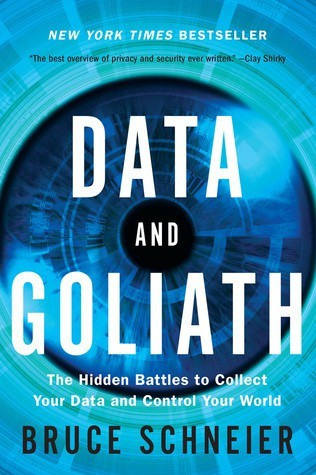
Data and Goliath
The Hidden Battles to Collect Your Data and Control Your World
کتاب های مرتبط
- اطلاعات
- نقد و بررسی
- دیدگاه کاربران
نقد و بررسی

March 16, 2015
Security technologist Schneier (Schneier on Security) eloquently limns the challenges of maintaining privacy in the Internet age, and offers some thoughtful proposals to preserve individual freedom without compromising national security. Even readers well versed in the issues are likely to be shocked by some instances of technological intrusions, such as when a school district near Philadelphia lent high school students laptops installed with highly invasive spyware. Schneier plausibly makes the case that the powerful algorithms of companies such as Facebook could be used to actually manipulate American elections. The book also notes the psychological aspects of the loss of control of one's data. For example, for most of human history "interactions and conversations have been ephemeral," and the indefinite preservation of online interactions has social and emotional repercussions for which society is unprepared. Schneier may be accused by some of minimizing the threat from terrorism, however, as when he dismisses terrorists as no more of a danger than organized crime, an analogy that weakens the overall strength of his case.

June 15, 2015
Schneier, a fellow at Harvard's Berkman Center for Internet and Society, has written an exceptionally readable yet thoroughly chilling book about the dangers of the ubiquitous mass surveillance we face thanks to modern life. While the author focuses on the United States, the rest of the world is largely capable of nearly the same levels of surveillance thanks to the openness of the Internet and the availability of cell phones. Schneier describes the types of data being collected about us, stemming from our interactions, activities, purchases, and where we go. As he competently explains, this "metadata" provides those collecting it with the entire framework of our existence: who we converse with and the duration of the conversation, the things we read (especially electronically), and what we buy. Corporations use this data to deliver targeted advertising and sell our information to other corporations at a large profit. Governments employ the data to map our interactions and otherwise infiltrate our privacy. As Schneier helps us understand the issues, he makes the case that "Ubiquitous mass surveillance is the enemy of democracy, liberty, freedom, and progress." Though there are few signs of change in corporate and government surveillance practices, Schneier devotes a chapter to practical solutions we can use to limit how we are tracked, information about how other countries approach privacy, and a set of potential principles we could adopt. VERDICT This timely, significant, and engaging book will appeal to citizens and noncitizens alike, to those who have ever used credit or debit cards to make purchases, who have browsed the Internet, who use email, who make purchases online...the list goes on. An essential book for almost everyone.--Candice Kail, Columbia Univ. Libs., New York
Copyright 2015 Library Journal, LLC Used with permission.

























دیدگاه کاربران